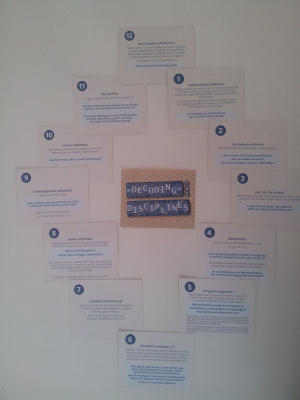No edit summary |
No edit summary |
||
| Line 3: | Line 3: | ||
Formally the writing process is a combination of Steps 1 and 2 of the [[Decoding process]]. | Formally the writing process is a combination of Steps 1 and 2 of the [[Decoding process]]. | ||
==Writing prompts== | ==Writing prompts== | ||
[[File:writing process.jpg|alt=photo of writing prompts printed on cards|thumb]] | |||
<br /> | |||
===Determine the bottleneck=== | ===Determine the bottleneck=== | ||
Ask yourself: In which situation do students struggle or fail in my class? What type of tasks or (exam) problems are regularly difficult for them? List some of these situations. | Ask yourself: In which situation do students struggle or fail in my class? What type of tasks or (exam) problems are regularly difficult for them? List some of these situations. | ||
| Line 21: | Line 22: | ||
===What experts do=== | ===What experts do=== | ||
... | |||
===Get feedback (1)=== | ===Get feedback (1)=== | ||
... | |||
===Get feedback (2)=== | ===Get feedback (2)=== | ||
... | |||
===Continue writing=== | ===Continue writing=== | ||
... | |||
===Detect difficulties=== | ===Detect difficulties=== | ||
... | |||
===Continue writing=== | ===Continue writing=== | ||
... | |||
===Reflect=== | ===Reflect=== | ||
... | |||
==See also== | ==See also== | ||
Kaduk, S.; Lahm, S. (2018): Decoding the Disciplines: Ein Ansatz für forschendes Lernen und Lehren. In: Lehmann, L.; Mieg, H. (Eds.): Forschendes Lernen. Ein Praxisbuch. Potsdam: Verlag der Fachhochschule Potsdam | Kaduk, S.; Lahm, S. (2018): Decoding the Disciplines: Ein Ansatz für forschendes Lernen und Lehren. In: Lehmann, L.; Mieg, H. (Eds.): Forschendes Lernen. Ein Praxisbuch. Potsdam: Verlag der Fachhochschule Potsdam | ||
==References== | ==References== | ||
Revision as of 09:05, 10 September 2020
Although frequently featured, the Decoding interview is by now means the exclusive method for decoding expertise. Svenja Kaduk and Swantje have developed a structured writing process that allows teachers to decode their expertise by themselves. To this end they answer a series of questions about the bottleneck an then about the thinking they do to get through the bottleneck. The questions are provided as writing prompts. Originally the prompts have been written in German.[1]
Formally the writing process is a combination of Steps 1 and 2 of the Decoding process.
Writing prompts
Determine the bottleneck
Ask yourself: In which situation do students struggle or fail in my class? What type of tasks or (exam) problems are regularly difficult for them? List some of these situations.
Then decide to proceed with a bottleneck on your list you are really concerned about.
Explicate the bottleneck
Describe the bottleneck as precisely as possible. What is it that students don't do or don't do correctly? What is it that they don't understand?
What do you do?
Describe what you as an expert in your discipline) do, such that you do not get stuck. For example ask yourself: What do I do to cope with the bottleneck?
Check
Look again at the bottleneck and ask yourself: Have I selected a too large bottleneck? Or one that is too small? Is its description too vague? Is the bottleneck really about an issue which is essential to my discipline or class?
Again, describe the bottleneck as precisely as possible. Ask yourself: Is the bottleneck is related to characteristic misconceptions?
What experts do
...
Get feedback (1)
...
Get feedback (2)
...
Continue writing
...
Detect difficulties
...
Continue writing
...
Reflect
...
See also
Kaduk, S.; Lahm, S. (2018): Decoding the Disciplines: Ein Ansatz für forschendes Lernen und Lehren. In: Lehmann, L.; Mieg, H. (Eds.): Forschendes Lernen. Ein Praxisbuch. Potsdam: Verlag der Fachhochschule Potsdam
References
- ↑ Kaduk, S.; Lahm, S. (2018): Decoding the Disciplines: Ein Ansatz für forschendes Lernen und Lehren. In: Lehmann, L.; Mieg, H. (Eds.): Forschendes Lernen. Ein Praxisbuch. Potsdam: Verlag der Fachhochschule Potsdam
